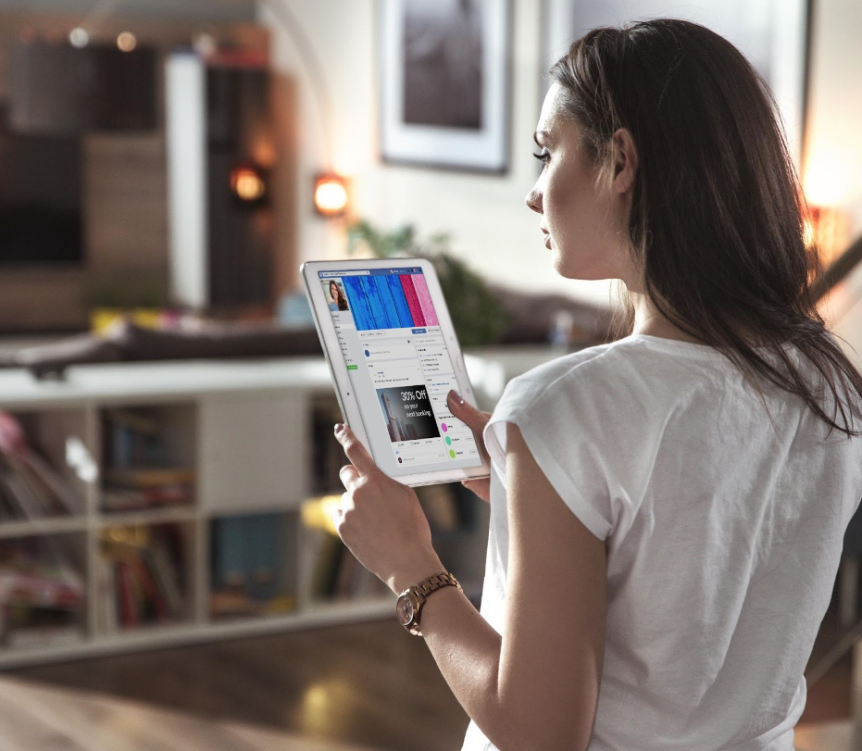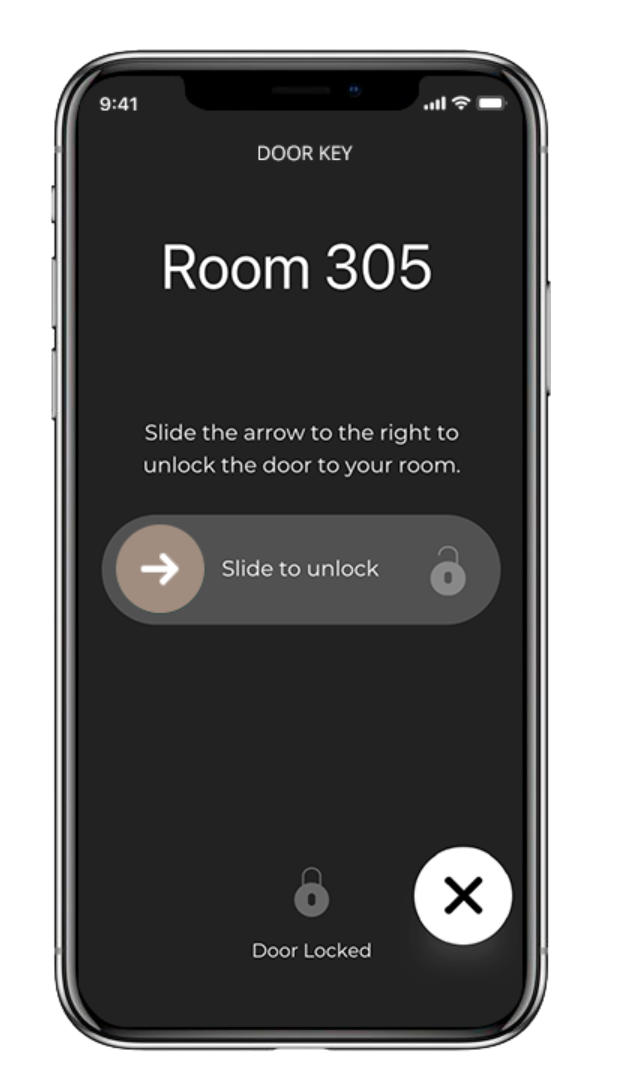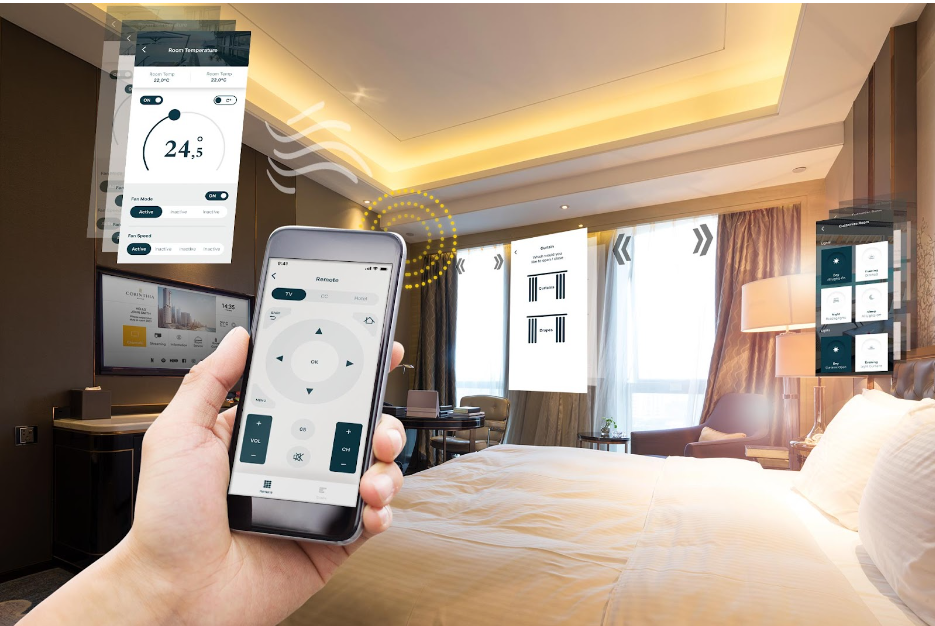Mobile key solutions for hotels are not a tech trend of the future anymore. Hotels worldwide started implementing this technology with mobile check-in and hotel mobile apps to create the seamless guest journey their customers need. Surveyed hotel guests also share that they expect to use more digital technologies during their hotel stays.
For hoteliers, it is essential to meet customer expectations and stay on top of new tech trends to gain a competitive edge. However, it’s also necessary to make an educated decision when investing in such technologies. So what are the pros and cons of the growing hotel tech trend?
Hotel Tech Trends to Improve Guest Experience
Hotel technology has significantly increased guest experience in the past few years. Keeping up with the latest hotel tech trends helps hoteliers stay competitive and improve their revenue. Some of the must-try tech trends for hotels are guest-room automation, predictive maintenance, mobile engagement, hyper-personalization, API and third-party integrations.
Guest-room automation
The hotel experience should always meet customer expectations and needs. Since innovative technologies have occupied the modern home, a hotel should be able to recreate that level of control and comfort and even surpass functionalities.
Today, people can control different aspects of their homes through their mobile devices, such as a smartphone or a tablet and even voice control, thanks to virtual assistants like Amazon Alexa and Google Assistant.
Hotels should consider these trends and implement them in guest rooms, allowing guests to control smart TVs, lighting, curtains, temperature and others. Guest room automation also involves using hotel apps and mobile keys to unlock rooms and other amenities.
Predictive maintenance (PdM)
Predictive maintenance (PdM) is another one of the latest trends in the hospitality industry. The technology uses sensor devices to monitor the conditions of assets and supply data in real-time.
PdM is used to help hoteliers predict when a piece of equipment will need maintenance services and prevent its failure. The technology helps increase customer satisfaction by guaranteeing they can always rely on perfectly functioning air-conditioning, lighting, heating and water supply systems.
Mobile engagement
Mobile engagement is more critical than ever, with people using their mobile devices to do anything from entertainment to conducting business. Hotel owners actively develop tailored mobile apps to create a pleasant user experience and keep up with competitors.
Mobile apps offer mobile check-ins, using mobile keys, guest room control, and ordering room service. But mobile engagement is not limited to using hotel apps. Optimizing the hotel website and adding opt-ins to send a weekly newsletter and offer a guest loyalty program are ideas everyone in the hotel industry should consider.
Hyper-personalization
Hyper-personalization helps hotels achieve the tailored stay hotel guests need to make them feel special. Artificial intelligence (AI) and machine learning (ML) create predictive algorithms that detect a person’s preferences by analyzing their searches, online behavior and website interactions.
With the help of these technologies, hotels can create personalized offers that meet the specific guest’s interest and thus increase hotel revenue by increasing the number of purchases. Hotels can also use them for memorizing guest preferences for their next stay.
APIs and third-party integrations
APIs (application programming interface) and third-party integrations are necessary to make all of the aforementioned tech trends possible until a full vendor consolidation occurs. These tech solutions allow hotels to offer innovative services such as contactless guest experience, functional IoT (Internet of Things) devices, virtual concierges, etc.
Mobile Key: The Pros and Cons of the Growing Hotel Tech Trend
Mobile keys are an essential part of the guest-room automation and mobile engagement tech trends and are currently implemented in hotels worldwide. But to invest in such technology, it’s vital to consider the pros and cons of a mobile room key for hotel guests and hotels.
Pros of Mobile Keys
A digital key can offer hotel guests control over their stay during their holiday or business trip. Combined with mobile check-in, customers are no longer required to physically attend to the front desk and wait in line before unloading their luggage. Mobile keys allow guests to conveniently access their hotel rooms and other hotel amenities with their smartphones.
Hotels can benefit from implementing mobile key technology by reducing the number of staff members needed at the front desk and the costs of replacing old damaged keys and key cards.
Hotel security also significantly improves, as you eliminate the chance of a guest losing their physical key. However, if a person loses their device, you can quickly block the room access allowed by the particular device instead of worrying about lost keys.
In addition, this mobile technology can simplify hotel operations and encourage guests to use hotel apps, thus helping hotels increase their revenue by showing relevant and personalized offers.
Many hotels reported an increase in direct bookings because their customers started operating through the hotel apps.
Cons of Mobile Keys
On one side, hotel guests enjoy skipping the front desk line and can immediately start enjoying their hotel stay. On the other side, cutting the line means less guest-staff interaction, resulting in decreased satisfaction and negative feedback. However, hotels can easily avoid that by ensuring guests’ needs are attended to, and staff members communicate with customers in other ways.
Unfortunately, investing in mobile key technology can be costly at first. Although it pays off in the long run and saves you from constantly replacing broken or demagnetized key cards, most hotels can find it difficult to devote their budget to this tech trend.
Hoteliers should also consider that implementing relatively new technology requires hotel staff members to be fully trained to work with it. Educating new guests about new operating systems can also be challenging. That’s why hotels should think of ways to do it before the guests arrive or place informational signs in the lobby.
Future trends in the hotel industry
Future trends in the hotel industry are already being implemented, and their success is constantly growing. Hotels need to consider some of the most popular trends to stay on top of the competition and continue impressing their guests.
Some of them are :
- Hotel virtual reality tours
- Voice search and voice control
- Facial recognition technology
- Hotel robots
- Service automation.
FAQs
How does a mobile key work?
A mobile key requires a smartphone device and a mobile key lock placed on the hotel room door. The technology uses Bluetooth or NFC (near-field communication) to ensure a connection between the device and the lock. Once the device is placed near the appropriate door lock, it sends a signal, and the door unlocks.
Is Bluetooth or NFC our best bet?
BLE (Bluetooth low energy) is most preferred within the hospitality sector due to NFC’s integration complexity. NFC requires access to the SIM card or the secure element on the handset, while BLE is available on most smartphones.
Why is mobile key taking over in hotels?
Mobile keys offer benefits for hotel guests and hoteliers. They do not require using and transferring key cards at the front desk and are available on the guest’s mobile device. Hotels benefit from saving up staff members’ time, increasing revenue through their hotel apps and increasing direct hotel bookings.
Are digital keys safe?
Digital keys reduce physical contact and eliminate the risk of transmitting germs, and are very safe for use. Their encryption ensures that the right person will use them, and if the device is lost, the access management system will immediately restrict the mobile access.




